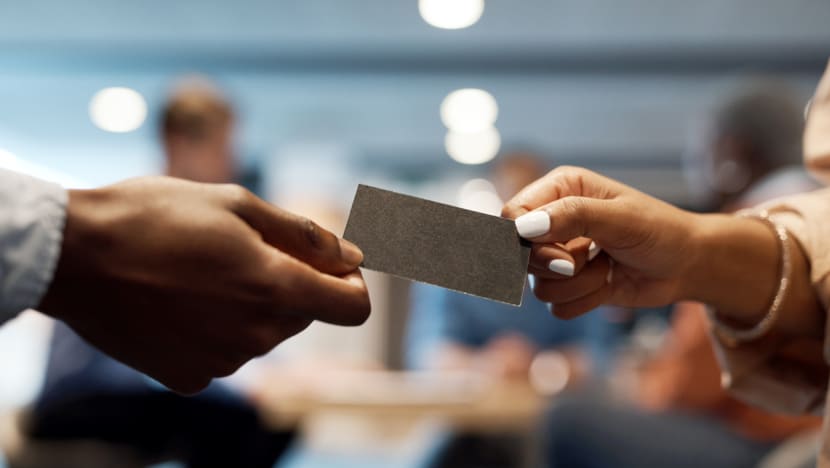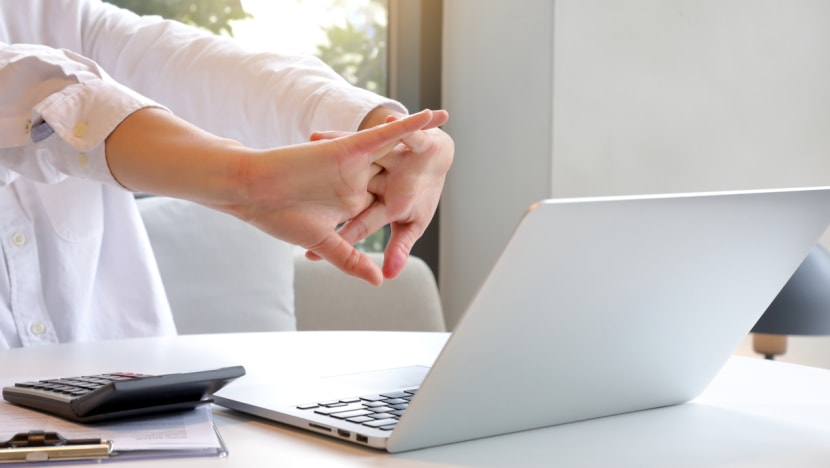Commentary: The business card is back, sort of
Digital tech is killing the business card as we knew it, which is no bad thing, says the Financial Times' Pilita Clark.

File photo. A business card can help people remember you. (Photo: iStock/PeopleImages)
LONDON: From time to time, people say unexpected things in the comments section below this column, but the other day one remark stood out. It came from a reader demanding something to be done about the parlous state of the business card.
“I am sick of being given all manner of excuses by younger professional people in meetings for why they have no card to give me,” this person fumed. “I just say, if you want me to remember you were at this meeting, you can give me a card: Otherwise in a week, when I look at my cards from this trip, you will have ceased to exist.
“What’s WITH these sheepish slobs? Why don’t their bosses insist? Why didn’t their parents teach them?”
Phew, I thought. Thank goodness I do not come across people like that in my day job. Except that I do.
A week later, I went to a business conference where, as usual, I arrived without one of the hundreds of business cards that have sat in the back of my desk drawer since the outbreak of the pandemic.
This seemed a good place for them to stay. Long before the pandemic, it felt that card use was fading in an age of LinkedIn and airdropping. Just because physical mingling had returned, did people really want to go back to swapping germ-laden bits of cardboard bearing data that took hours of tedious labour to type into a phone back home?

WHERE'S YOUR BUSINESS CARD?
As it turns out, at this conference they very much did. Every second person there was whipping out a business card. Men. Women. Young. Old. Everyone seemed to have one, bar me. The third or fourth time I feebly apologised for not having a card, a middle-aged man curtly asked, “Why not?”
It was a shame that another slightly older (and more famous) man did not leave his cards at home. I watched for quite a while as he thrust one after another into the hand of each man he met, but failed to offer any to a single woman he was introduced to, no matter how high-flying.
So is the business card back? Yes and no.
As the pandemic eases, sales are rebounding at Vista, parent of VistaPrint, one of the world’s largest makers of traditional business cards.
Business card revenues grew 10 per cent in the year to Jun 30, the company told me last week. But one particular type of product is really thriving: Cards with a QR code or other type of tech that lets you download contact details digitally.
“When we introduced digital business cards - physical cards with a digital element - in April, it became our fastest growing new product introduction in the category and we expect continued growth,” said Emily Whittaker, Vista’s executive vice-president for commerce.
BUSINESS CARDS WITH QR CODES
The trend was evident at the conference I went to where, in the middle of yet another card-handing circle, one man brandished his iPhone at me and said, “Point your camera at this.” A QR code, once scanned, instantly sent his contact details into my phone’s address book.
Another person took a hybrid approach, flourishing a bamboo card with a QR code printed on the back that she kept after others snapped it.
Clearly, an advancing army of technologies is transforming the business card. They include NFC, or near field communication chips that people are sticking on their phones or in one (hopefully rare) case, implanting into their hand.
I am not sure what the fuming FT reader would make of this shift, but personally I am hooked.
I like the physical certainty of a printed card, and it is true that, when I got home, the cards reminded me who I had met more than the invisibly transferred phone details. Dead batteries might be a problem for the QR clan too.
But having spent hours of my working life transferring finely printed contact details into my phone, and fiddling with camera apps that promise to do the same but rarely do, it is blissful to have someone’s details jump instantly into your contact list.
I think the nice printed FT cards sitting in my desk will be lasting for a very long time indeed.


















